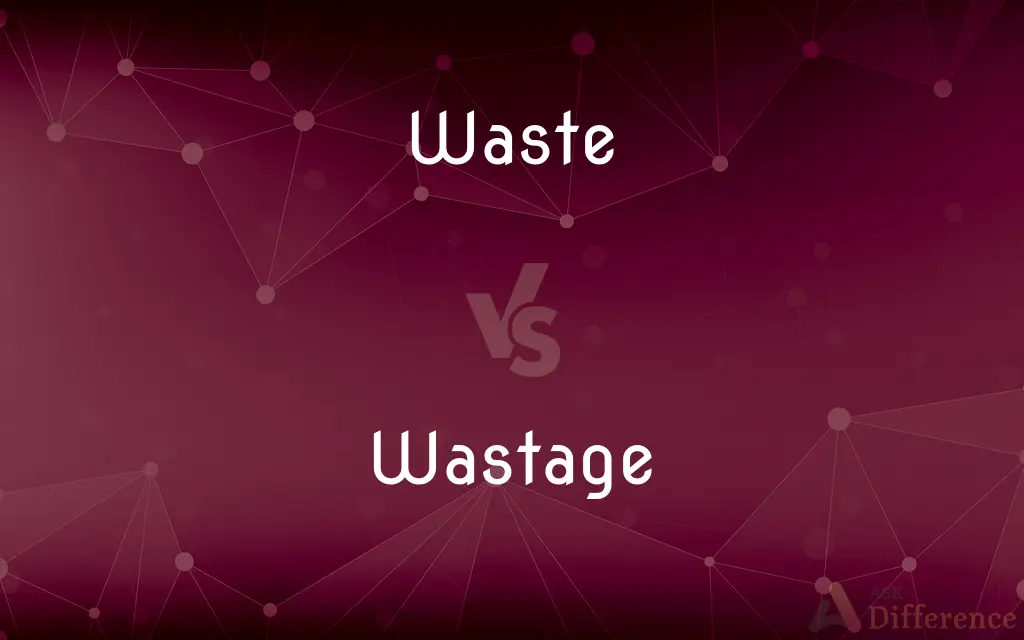Waste vs. Wastage — What's the Difference?
By Fiza Rafique & Urooj Arif — Updated on March 4, 2024
Waste refers to unwanted or unusable materials, while wastage emphasizes the action or process of wasting materials or resources.

Difference Between Waste and Wastage
Table of Contents
ADVERTISEMENT
Key Differences
Waste primarily denotes materials that are unwanted, unusable, or discarded after primary use or is of no use due to spoilage or other reasons. This term can apply broadly to various contexts, from industrial waste products to household garbage. On the other hand, Wastage focuses more on the process or act of wasting, whether it's resources, time, or materials. It implies a loss that could potentially have been avoided, highlighting the reduction of something valuable through its misuse or inefficiency.
While waste encompasses the physical items or substances discarded, wastage refers to the quantity or extent of loss through the process of wasting. For example, food waste refers to the actual food items thrown away, whereas food wastage would focus on the process and impacts of losing food, including the economic, environmental, and social consequences. This distinction is crucial in discussions about sustainability and resource management, where the emphasis is not only on the waste itself but also on the implications of the wasting process.
In environmental and economic contexts, distinguishing between waste and wastage can help identify areas for improvement in efficiency and sustainability. Waste reduction strategies often focus on minimizing the generation of waste materials, while wastage reduction can involve broader measures, including improving processes, enhancing resource use efficiency, or changing behaviors to prevent the loss of resources before they become waste.
The terms also differ in their usage in various sectors. In the manufacturing sector, waste might refer to by-products or scraps, whereas wastage could describe the loss of materials through inefficiency or defects in the production process. Similarly, in the food industry, efforts to combat food waste might involve better storage and preservation techniques, while addressing food wastage could include initiatives to streamline supply chains and reduce losses from farm to fork.
Understanding the difference between waste and wastage is important for developing effective strategies for resource conservation and sustainability. By comprehensively addressing both the tangible aspects of waste and the processes leading to wastage, individuals and organizations can work towards more sustainable practices that benefit both the environment and society.
ADVERTISEMENT
Comparison Chart
Definition
Unwanted or unusable materials.
The action or process of wasting.
Focus
Physical items or substances.
Process and impact of loss.
Contexts
Broad applications (environmental, industrial, household).
Often refers to efficiency and resource management.
Examples
Industrial emissions, household garbage.
Resource depletion, energy loss.
Key Concerns
Reduction of waste generation.
Improving process efficiency, reducing resource loss.
Compare with Definitions
Waste
Discarded substances.
Industrial waste can be toxic.
Wastage
Loss of resources.
Wastage of water in leaks is preventable.
Waste
Excess resources.
Water waste in agriculture is a concern.
Wastage
Environmental impact.
Food wastage has a carbon footprint.
Waste
Spoiled goods.
Food waste contributes to global hunger.
Wastage
Economic loss.
Crop wastage affects farmers' incomes.
Waste
Unwanted materials.
Plastic waste pollutes oceans.
Wastage
Process inefficiency.
Production wastage reduces profitability.
Waste
By-products.
Construction waste includes bricks and metal.
Wastage
Reduction in efficiency.
Energy wastage increases costs.
Waste
Waste (or wastes) are unwanted or unusable materials. Waste is any substance which is discarded after primary use, or is worthless, defective and of no use.
Wastage
Loss by deterioration, wear, or destruction
"Disease and desertion still caused much greater wastage than battle" (Theodore Ropp).
Waste
Get rid of;
We waste the dirty water by channeling it into the sewer
Wastage
The gradual process of wasting.
Waste
Run off as waste;
The water wastes back into the ocean
Wastage
An amount that is wasted or lost by wear.
Waste
Disposed of as useless;
Waste paper
Wastage
The process of wasting
Wastage
Anything lost by wear or waste
Common Curiosities
Are waste management and wastage reduction the same?
Waste management focuses on handling waste materials, while wastage reduction aims to prevent or decrease the loss of resources before they become waste.
Can wastage lead to waste?
Yes, wastage can lead to the generation of waste, as it involves the loss or inefficient use of resources that become unwanted.
How can reducing wastage impact the environment?
Reducing wastage can lessen the environmental impact by minimizing resource depletion and lowering the generation of waste.
Why is it important to distinguish between waste and wastage in sustainability discussions?
Distinguishing between the two helps identify more comprehensive strategies for reducing environmental impact through both waste management and process efficiency improvements.
Can efforts to reduce wastage also reduce waste?
Yes, improving efficiency and resource use can lead to less waste generation.
What is the difference between waste and wastage?
Waste refers to unwanted materials, while wastage emphasizes the process or act of wasting resources or materials.
Is all waste a result of wastage?
Not all waste results from wastage; some waste is an inevitable by-product of processes or consumption.
Is wastage only related to physical resources?
No, wastage can also refer to the inefficient use of time, energy, or other intangible resources.
What are common examples of waste?
Common examples include household trash, food scraps, and industrial by-products.
How can individuals contribute to reducing wastage?
Individuals can contribute by using resources more efficiently, recycling, and supporting sustainable practices.
What impact does food wastage have on society?
Food wastage contributes to hunger, economic loss, and environmental damage through wasted resources and greenhouse gas emissions.
How can communities address waste and wastage?
Communities can promote recycling, support local sustainability initiatives, and educate about efficient resource use.
Can technology help reduce wastage?
Yes, advancements in technology can improve resource use efficiency and process optimization, reducing wastage.
What role do businesses play in wastage reduction?
Businesses can implement more efficient processes, reduce production losses, and design products for sustainability.
What are common examples of wastage?
Examples include energy loss in inefficient appliances, water leaks, and excess production materials.
Share Your Discovery

Previous Comparison
Biologic vs. Biological
Next Comparison
Nil vs. NoneAuthor Spotlight
Written by
Fiza RafiqueFiza Rafique is a skilled content writer at AskDifference.com, where she meticulously refines and enhances written pieces. Drawing from her vast editorial expertise, Fiza ensures clarity, accuracy, and precision in every article. Passionate about language, she continually seeks to elevate the quality of content for readers worldwide.
Co-written by
Urooj ArifUrooj is a skilled content writer at Ask Difference, known for her exceptional ability to simplify complex topics into engaging and informative content. With a passion for research and a flair for clear, concise writing, she consistently delivers articles that resonate with our diverse audience.














































